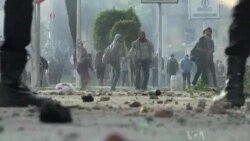CAIRO —
ຂະນະນີ້ບັນດາເຈົ້າໜ້າທີ່ອິຈິບ ກໍາລັງດິ້ນຮົນ ເພື່ອນໍາ
ເອົາສະຖຽນລະພາບ ກັນຄືນສູ່ປະເທດ ລຸນຫຼັງເວລາເກືອບ
ສາມປີຂອງການລຸກຮືຂຶ້ນ ແລະການ ປ່ຽນແປງຢ່າງຮຸນແຮງ.
ແຕ່ຄວາມບໍ່ພໍໃຈຂອງມະຫາຊົນນໍາບັນດາຜູ້ປົກ ຄອງປະເທດ
ຊຸດລ່າສຸດ ກໍປະກົດວ່າ ກໍາລັງຂະຫຍາຍກວ້າງອອກເລື້ອຍໆ.
ດັ່ງທີ່ Elizabeth Arrott ຜູ້ສື່ຂ່າວວີໂອເອ ລາຍງານມາຈາກ
ນະຄອນຫຼວງໄຄໂຣນັ້ນ ກໍແມ່ນວ່າ ປີ 2014 ນີ້ ກໍຍັງຈະບໍ່ຮັບ
ປະກັນໄດ້ວ່າ ຄວາມວຸ້ນວາຍຕ່າງໆ ຈະຍຸດຕິລົງ. ດາຣາມີລາຍ
ລະອຽດມາສະເໜີທ່ານ.
ຊາວອີຈິບພາກັນ ລົງສູ່ຖະໜົນຫົນທາງ ເດີນຂະບວນປະທ້ວງ ເພື່ອຂັບໄລ່ຜູ້ນໍາຂອງພວກ
ເຂົາເຈົ້າ ໃນປີ 2013 ນີ້ ຊຶ່ງເປັນຄັ້ງທີ່ສອງໃນຮອບສອງປີ.
ພວກເຂົາເຈົ້າໄດ້ຮັບການ ຊ່ວຍເຫຼືອຢ່າງໃຫຍຫລວງຈາກຝ່າຍທະຫານ ທີ່ໄດ້ຈັບແລະ
ຂັງຄຸກ ທ່ານ Mohamed Morsi ຫົວອິສລາມເຖິງຖອງ ຊຶ່ງເປັນປະທານາທິບໍດີ ທີ່ຖືກ
ເລືອກຕັ້ງຢ່າງເສລີຄົນທໍາອິດຂອງອີຈິບ ແລະໄດ້ກວດລ້າງພວກທີ່ສະໜັບສະໜຸນທ່ານ.
ວີດີໂອ: ອີຈິບປະກາດໃຫ້ພັກພະລາດອນພາບ ເປັນອົງການກໍ່ການຮ້າຍ:
ລັດຖະບານຊົ່ວຄາວ ທີ່ໜຸນຫຼັງໂດຍຝ່າຍທະຫານນັ້ນ ໄດ້ສະເໜີອັນທີ່ເອີ້ນວ່າ “ແຜນທີ່
ຫົນທາງ” ໄປສູ່ສະຖຽນລະພາບຂອງປະເທດ ຄືລັດຖະທໍາມະນູນສະບັບໃໝ່ ໂດຍໃຫ້ມີ
ການລົງປະຊາມະຕິຮັບຮອງເອົາ ຕິດຕາມດ້ວຍການເລືອກຕັ້ງປະທານາທິບໍດີ ແລະສະພາ
ແຫ່ງຊາດ.
ໃນເບື້ອງຕົ້ນ ຊາວອີຈິບຫຼາຍຄົນສະໜັບສະໜຸນຄະນະນໍາພາໃໝ່ ທີ່ໄດ້ສັນຍາວ່າ ຈະ
ຕັດພັກພະລາດອນພາບມຸສລິມຂອງທ່ານ Morsi ອອກຈາກ ການເມືອງຂອງປະເທດ.
ແຕ່ນັກເຄື່ອນໄຫວ Wael Khalil ເວົ້າວ່າ ເລື້ອງນັ້ນກໍາລັງເລີ່ມຈະປ່ຽນແປງໄປ.
ນັກເຄຶ່ອນໄຫວ Khalil ເວົ້າວ່າ: “ການທີ່ຈະເອົາທ່ານ Morsi ກັບຄືນມາກໍາອໍາ
ນາດອີກນັ້ນ ມັນບໍ່ແມ່ນທາງອອກ ບໍ່ແມ່ນທາງອອກທີ່ເຮົາອາດປ່ອຍໃຫ້ເປັນ
ໄປໄດ້. ສະນັ້ນໃນຕອນນີ້ ພວກເຮົາຈຶ່ງກໍາລັງພິຈາລະນາເບິ່ງພວກ ທີ່ກໍາອໍາ
ນາດຢູ່ຂະນະນີ້ ຢ່າງລະອຽດຖີ່ຖ້ວນຫລາຍຂຶ້ນ.”
ບັດນີ້ ພວກປະທ້ວງຕໍ່ຕ້ານລັດຖະບານ ບໍ່ມີແຕ່ພວກທີ່ສະໜັບສະໜຸນທ່ານ Morsi
ເທົ່ານັ້ນ ແຕ່ຍັງມີໂຮມທັງພວກນິຍົມທາງໂລກ ແລະພວກນັກເຄຶ່ອນໄຫວອື່ນໆ ທີ່ຄັດ
ຄ້ານຍຸທະວິທີຜະເດັດການຕ່າງໆ ທີ່ພວກເຂົາເຈົ້ົາຄິດວ່າ ໄດ້ຂັບໄລ່ກໍາຈັດອອກໄປ
ແລ້ວ ໃນປີ 2011 ນັ້ນ.
ທ່ານ Khalil ເວົ້າອີກວ່າ: “ ມີຄົນໃນຈໍານວນຫຼາຍຂຶ້ນເລື້ອຍໆ ທີ່ເລີ່ມຈະພາກັນ
ເຫັນ ທໍາອິດນັ້ນ ການຫວນກັບຄືນມາຂອງລັດຕໍາຫຼວດ ແລະເຫັນວ່າແທ້ໆແລ້ວ ຝ່າຍຕໍາຫຼວດພາກັນກັບຄືນມາ ພ້ອມກັບການ ແກ້ແຄ້ນ.”
ນອກນີ້ແລ້ວ ກໍມີພວກທີ່ບໍ່ພໍໃຈໃນດ້ານເສດຖະກິດນໍາ. ຄໍາຂວັນຂອງການປະຕິວັດປີ
2011 ເວົ້າວ່າ: “ເຂົ້າຈີ່ ເສລີພາບ ແລະກຽດສັກສີ” ຊຶ່ງເປັນສິ່ງນຶ່ງທີ່ນັກວິເຄາະການ
ເມືອງ Hisham Kassem ເວົ້າວ່າ ຍັງເປັນໝາກຫົວໃຈຂອງບັນຫາທັງຫຼາຍຂອງຊາດ
ນັ້ນຢູ່.
ທ່ານ Kassem ເວົ້າວ່າ: “ນີ້ຄືປະເທດນຶ່ງ ທີ່ຖືກຜັກດັນໄປຢູ່ຂອບສຸດແລ້ວ ແລະ
ຕາບໃດທີ່ບັນຫາເຫຼົ່ານີ້ບໍ່ຖືກແກ້ໄຂກັນ ກໍອາດຈະມີການລຸກຮືຂຶ້ນ ຄັ້ງທີ່ສາມ ທີ່
ສີ່ ແລະທີ່ຫ້າ ເກີດຂຶ້ນມາອີກໄດ້. ມັນຈະບໍ່ຢຸດຢູ່ທີ່ນັ້ນ ແລະບໍ່ວ່າຈະເປັນຝ່າຍທະ
ຫານ ຫຼືຝ່າຍອີສລາມຫົວຮຸນແຮງ ໃຜກໍຕາມທີ່ຢູ່ໃນຕໍາແໜ່ງເວລານີ້ ຈະຕ້ອງ
ຫາທາງແກ້ໄຂ ແລະສະໜອງຕອບຄວາມຕ້ອງການຂອງປະຊາຊົນໃຫ້ໄດ້.”
ທ່ານ Saad Eddin Ibrahim ນັກວິເຄາະການເມືອງເວົ້າວ່າ ແຕ່ວ່າໃນຂະນະທີ່ລັດຖະ
ບານ ກໍາລັງພະຍາຍາມນໍາເອົາປະເທດຊາດກ້າວໄປຂ້າງໜ້ານັ້ນ ກໍບໍ່ແມ່ນວ່າ ໝົດທຸກ
ຄົນມີຄວາມຮູ້ສຶກມືດມົນກ່ຽວກັບປະເທດຊາດ.
ທ່ານ Eddin ເວົ້າວ່າ: “ປົກກະຕິແລ້ວ ການປະຕິວັດໃດໆ ແມ່ນຈະໃຊ້ເວລາສິບປີ
ຫຼື ປະມານນັ້ນ ກ່ອນທີ່ທຸກສິ່ງທຸກຢ່າງຈະສະຫງົບລົງ.”
ທ່ານ Ibrahim ເວົ້າວ່າ ສໍາລັບອີຈິບ ອາດບໍ່ໃຊ້ເວລາດົນປານນັ້ນດອກ ເພື່ອຈະຄືນສູ່
ສະພາບປົກກະຕິໄດ້. ທ່ານເຊື່ອວ່າ ໃນທີ່ສຸດນັ້ນ ຄວາມເໝື່ອຍໜ່າຍກັບການປະຕິວັດ
ຈະເຂົ້າມາຄອບງໍາ ເຖິງແມ່ນວ່າເວລານີ້ ສະພາບການຢູ່ຕາມຖະໜົນຫົນທາງຂອງອີຈິບ
ຍັງບໍ່ສະແດງໃຫ້ເຫັນຮ່ອງຮອຍໃດໆເທື່ອ ກໍຕາມ.
ຄວາມເຄ່ງຕຶງເພີ້ມທະວີຂຶ້ນ ລະຫວ່າງກຸ່ມພະລາດອນພາບ ກັບລັດຖະບານອີຈິບ:
More Struggles Predicted in Egypt’s Forecast for Year Ahead
Egyptian authorities are struggling to bring stability to their nation after nearly three years of uprisings and upheaval. But popular discontent with the latest set of rulers appears to be growing; 2014 offers no guarantee the tumult is over.
2013 saw Egyptians take to the streets to depose their leader, the second mass uprising in two years.
They had generous help from the military, which imprisoned the country's first freely elected president, Islamist Mohamed Morsi, and cracked down on his supporters.
The military-backed interim government has offered a “roadmap” to stability: a new constitution, to be put to a referendum, followed by presidential and parliamentary votes.
At first, many Egyptians supported the new leadership, with its promise to keep Morsi's Muslim Brotherhood out of the picture.
But activist and prominent blogger Wael Khalil said that's beginning to change. "Getting Morsi back in power is not an outcome - is not a probable outcome - so that we are now looking with more scrutiny at those in power," he said.
Anti-government protesters now include more than Morsi's supporters, with secular and other activists opposing the heavy-handed tactics they thought they'd banished in 2011.
"More and more people are starting to see, first of all, the return of the police state and how the police is really coming back with a vengeance," Khalil explained.
There is also economic discontent. Unemployment, lack of tourism and investment, plus inflation, especially in the sector of food and other basic commodities, are taking their toll.
The slogan of the 2011 Revolution was "bread, freedom, dignity," something political analyst Hisham Kassem said remains as relevant as ever. "This is a nation that has been pushed to the brink and as long as these issues are not addressed, there will be a third and fourth and a fifth uprising. It's not going to stop, and whether it is the military or the Islamists, whoever is now on the seat needs to deliver," he said.
But as the government attempts to move forward, not everyone is gloomy. Saad Eddin Ibrahim is the founding chairman of the Ibn Khaldun Center for Development Studies. "There is always a decade or so around in the revolutionary explosion before the volcano settles down and the ashes settle,” he stated.
Egypt, he said, won't take nearly that long, maybe just another year or so. He believes "revolution fatigue" is bound to set in - though the streets of Egypt show no sign of it yet.
ເອົາສະຖຽນລະພາບ ກັນຄືນສູ່ປະເທດ ລຸນຫຼັງເວລາເກືອບ
ສາມປີຂອງການລຸກຮືຂຶ້ນ ແລະການ ປ່ຽນແປງຢ່າງຮຸນແຮງ.
ແຕ່ຄວາມບໍ່ພໍໃຈຂອງມະຫາຊົນນໍາບັນດາຜູ້ປົກ ຄອງປະເທດ
ຊຸດລ່າສຸດ ກໍປະກົດວ່າ ກໍາລັງຂະຫຍາຍກວ້າງອອກເລື້ອຍໆ.
ດັ່ງທີ່ Elizabeth Arrott ຜູ້ສື່ຂ່າວວີໂອເອ ລາຍງານມາຈາກ
ນະຄອນຫຼວງໄຄໂຣນັ້ນ ກໍແມ່ນວ່າ ປີ 2014 ນີ້ ກໍຍັງຈະບໍ່ຮັບ
ປະກັນໄດ້ວ່າ ຄວາມວຸ້ນວາຍຕ່າງໆ ຈະຍຸດຕິລົງ. ດາຣາມີລາຍ
ລະອຽດມາສະເໜີທ່ານ.
ຊາວອີຈິບພາກັນ ລົງສູ່ຖະໜົນຫົນທາງ ເດີນຂະບວນປະທ້ວງ ເພື່ອຂັບໄລ່ຜູ້ນໍາຂອງພວກ
ເຂົາເຈົ້າ ໃນປີ 2013 ນີ້ ຊຶ່ງເປັນຄັ້ງທີ່ສອງໃນຮອບສອງປີ.
ພວກເຂົາເຈົ້າໄດ້ຮັບການ ຊ່ວຍເຫຼືອຢ່າງໃຫຍຫລວງຈາກຝ່າຍທະຫານ ທີ່ໄດ້ຈັບແລະ
ຂັງຄຸກ ທ່ານ Mohamed Morsi ຫົວອິສລາມເຖິງຖອງ ຊຶ່ງເປັນປະທານາທິບໍດີ ທີ່ຖືກ
ເລືອກຕັ້ງຢ່າງເສລີຄົນທໍາອິດຂອງອີຈິບ ແລະໄດ້ກວດລ້າງພວກທີ່ສະໜັບສະໜຸນທ່ານ.
ວີດີໂອ: ອີຈິບປະກາດໃຫ້ພັກພະລາດອນພາບ ເປັນອົງການກໍ່ການຮ້າຍ:
ລັດຖະບານຊົ່ວຄາວ ທີ່ໜຸນຫຼັງໂດຍຝ່າຍທະຫານນັ້ນ ໄດ້ສະເໜີອັນທີ່ເອີ້ນວ່າ “ແຜນທີ່
ຫົນທາງ” ໄປສູ່ສະຖຽນລະພາບຂອງປະເທດ ຄືລັດຖະທໍາມະນູນສະບັບໃໝ່ ໂດຍໃຫ້ມີ
ການລົງປະຊາມະຕິຮັບຮອງເອົາ ຕິດຕາມດ້ວຍການເລືອກຕັ້ງປະທານາທິບໍດີ ແລະສະພາ
ແຫ່ງຊາດ.
ໃນເບື້ອງຕົ້ນ ຊາວອີຈິບຫຼາຍຄົນສະໜັບສະໜຸນຄະນະນໍາພາໃໝ່ ທີ່ໄດ້ສັນຍາວ່າ ຈະ
ຕັດພັກພະລາດອນພາບມຸສລິມຂອງທ່ານ Morsi ອອກຈາກ ການເມືອງຂອງປະເທດ.
ແຕ່ນັກເຄື່ອນໄຫວ Wael Khalil ເວົ້າວ່າ ເລື້ອງນັ້ນກໍາລັງເລີ່ມຈະປ່ຽນແປງໄປ.
ນັກເຄຶ່ອນໄຫວ Khalil ເວົ້າວ່າ: “ການທີ່ຈະເອົາທ່ານ Morsi ກັບຄືນມາກໍາອໍາ
ນາດອີກນັ້ນ ມັນບໍ່ແມ່ນທາງອອກ ບໍ່ແມ່ນທາງອອກທີ່ເຮົາອາດປ່ອຍໃຫ້ເປັນ
ໄປໄດ້. ສະນັ້ນໃນຕອນນີ້ ພວກເຮົາຈຶ່ງກໍາລັງພິຈາລະນາເບິ່ງພວກ ທີ່ກໍາອໍາ
ນາດຢູ່ຂະນະນີ້ ຢ່າງລະອຽດຖີ່ຖ້ວນຫລາຍຂຶ້ນ.”
ບັດນີ້ ພວກປະທ້ວງຕໍ່ຕ້ານລັດຖະບານ ບໍ່ມີແຕ່ພວກທີ່ສະໜັບສະໜຸນທ່ານ Morsi
ເທົ່ານັ້ນ ແຕ່ຍັງມີໂຮມທັງພວກນິຍົມທາງໂລກ ແລະພວກນັກເຄຶ່ອນໄຫວອື່ນໆ ທີ່ຄັດ
ຄ້ານຍຸທະວິທີຜະເດັດການຕ່າງໆ ທີ່ພວກເຂົາເຈົ້ົາຄິດວ່າ ໄດ້ຂັບໄລ່ກໍາຈັດອອກໄປ
ແລ້ວ ໃນປີ 2011 ນັ້ນ.
ທ່ານ Khalil ເວົ້າອີກວ່າ: “ ມີຄົນໃນຈໍານວນຫຼາຍຂຶ້ນເລື້ອຍໆ ທີ່ເລີ່ມຈະພາກັນ
ເຫັນ ທໍາອິດນັ້ນ ການຫວນກັບຄືນມາຂອງລັດຕໍາຫຼວດ ແລະເຫັນວ່າແທ້ໆແລ້ວ ຝ່າຍຕໍາຫຼວດພາກັນກັບຄືນມາ ພ້ອມກັບການ ແກ້ແຄ້ນ.”
ນອກນີ້ແລ້ວ ກໍມີພວກທີ່ບໍ່ພໍໃຈໃນດ້ານເສດຖະກິດນໍາ. ຄໍາຂວັນຂອງການປະຕິວັດປີ
2011 ເວົ້າວ່າ: “ເຂົ້າຈີ່ ເສລີພາບ ແລະກຽດສັກສີ” ຊຶ່ງເປັນສິ່ງນຶ່ງທີ່ນັກວິເຄາະການ
ເມືອງ Hisham Kassem ເວົ້າວ່າ ຍັງເປັນໝາກຫົວໃຈຂອງບັນຫາທັງຫຼາຍຂອງຊາດ
ນັ້ນຢູ່.
ທ່ານ Kassem ເວົ້າວ່າ: “ນີ້ຄືປະເທດນຶ່ງ ທີ່ຖືກຜັກດັນໄປຢູ່ຂອບສຸດແລ້ວ ແລະ
ຕາບໃດທີ່ບັນຫາເຫຼົ່ານີ້ບໍ່ຖືກແກ້ໄຂກັນ ກໍອາດຈະມີການລຸກຮືຂຶ້ນ ຄັ້ງທີ່ສາມ ທີ່
ສີ່ ແລະທີ່ຫ້າ ເກີດຂຶ້ນມາອີກໄດ້. ມັນຈະບໍ່ຢຸດຢູ່ທີ່ນັ້ນ ແລະບໍ່ວ່າຈະເປັນຝ່າຍທະ
ຫານ ຫຼືຝ່າຍອີສລາມຫົວຮຸນແຮງ ໃຜກໍຕາມທີ່ຢູ່ໃນຕໍາແໜ່ງເວລານີ້ ຈະຕ້ອງ
ຫາທາງແກ້ໄຂ ແລະສະໜອງຕອບຄວາມຕ້ອງການຂອງປະຊາຊົນໃຫ້ໄດ້.”
ທ່ານ Saad Eddin Ibrahim ນັກວິເຄາະການເມືອງເວົ້າວ່າ ແຕ່ວ່າໃນຂະນະທີ່ລັດຖະ
ບານ ກໍາລັງພະຍາຍາມນໍາເອົາປະເທດຊາດກ້າວໄປຂ້າງໜ້ານັ້ນ ກໍບໍ່ແມ່ນວ່າ ໝົດທຸກ
ຄົນມີຄວາມຮູ້ສຶກມືດມົນກ່ຽວກັບປະເທດຊາດ.
ທ່ານ Eddin ເວົ້າວ່າ: “ປົກກະຕິແລ້ວ ການປະຕິວັດໃດໆ ແມ່ນຈະໃຊ້ເວລາສິບປີ
ຫຼື ປະມານນັ້ນ ກ່ອນທີ່ທຸກສິ່ງທຸກຢ່າງຈະສະຫງົບລົງ.”
ທ່ານ Ibrahim ເວົ້າວ່າ ສໍາລັບອີຈິບ ອາດບໍ່ໃຊ້ເວລາດົນປານນັ້ນດອກ ເພື່ອຈະຄືນສູ່
ສະພາບປົກກະຕິໄດ້. ທ່ານເຊື່ອວ່າ ໃນທີ່ສຸດນັ້ນ ຄວາມເໝື່ອຍໜ່າຍກັບການປະຕິວັດ
ຈະເຂົ້າມາຄອບງໍາ ເຖິງແມ່ນວ່າເວລານີ້ ສະພາບການຢູ່ຕາມຖະໜົນຫົນທາງຂອງອີຈິບ
ຍັງບໍ່ສະແດງໃຫ້ເຫັນຮ່ອງຮອຍໃດໆເທື່ອ ກໍຕາມ.
ຄວາມເຄ່ງຕຶງເພີ້ມທະວີຂຶ້ນ ລະຫວ່າງກຸ່ມພະລາດອນພາບ ກັບລັດຖະບານອີຈິບ:
More Struggles Predicted in Egypt’s Forecast for Year Ahead
Egyptian authorities are struggling to bring stability to their nation after nearly three years of uprisings and upheaval. But popular discontent with the latest set of rulers appears to be growing; 2014 offers no guarantee the tumult is over.
2013 saw Egyptians take to the streets to depose their leader, the second mass uprising in two years.
They had generous help from the military, which imprisoned the country's first freely elected president, Islamist Mohamed Morsi, and cracked down on his supporters.
The military-backed interim government has offered a “roadmap” to stability: a new constitution, to be put to a referendum, followed by presidential and parliamentary votes.
At first, many Egyptians supported the new leadership, with its promise to keep Morsi's Muslim Brotherhood out of the picture.
But activist and prominent blogger Wael Khalil said that's beginning to change. "Getting Morsi back in power is not an outcome - is not a probable outcome - so that we are now looking with more scrutiny at those in power," he said.
Anti-government protesters now include more than Morsi's supporters, with secular and other activists opposing the heavy-handed tactics they thought they'd banished in 2011.
"More and more people are starting to see, first of all, the return of the police state and how the police is really coming back with a vengeance," Khalil explained.
There is also economic discontent. Unemployment, lack of tourism and investment, plus inflation, especially in the sector of food and other basic commodities, are taking their toll.
The slogan of the 2011 Revolution was "bread, freedom, dignity," something political analyst Hisham Kassem said remains as relevant as ever. "This is a nation that has been pushed to the brink and as long as these issues are not addressed, there will be a third and fourth and a fifth uprising. It's not going to stop, and whether it is the military or the Islamists, whoever is now on the seat needs to deliver," he said.
But as the government attempts to move forward, not everyone is gloomy. Saad Eddin Ibrahim is the founding chairman of the Ibn Khaldun Center for Development Studies. "There is always a decade or so around in the revolutionary explosion before the volcano settles down and the ashes settle,” he stated.
Egypt, he said, won't take nearly that long, maybe just another year or so. He believes "revolution fatigue" is bound to set in - though the streets of Egypt show no sign of it yet.







